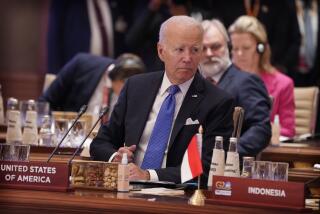With Little Ado, Koreas Link Railways
SEOUL — There were no balloons, no bands and no ribbon-cuttings Saturday as North and South Korea joined their severed railroads across the demilitarized zone in a ceremony marked by its lack of fanfare.
The connecting of the tracks came on the eve of the third anniversary of a landmark summit between the leaders of the estranged Koreas. Unlike the past two years, when the anniversary was boisterously celebrated, this year the mood was decidedly glum, with the North Korean nuclear crisis and a nagging financial scandal surrounding the 2000 summit casting a cloud over the occasion.
In addition, the much-anticipated railroad -- which is intended to eventually restore trade links among the Koreas, China and Russia -- is well behind the schedule set three years ago by North Korean leader Kim Jong Il and then-South Korean President Kim Dae Jung.
Although the tracks were joined Saturday, North Korea still has to complete more than seven miles of tracks before the first trains can run.
“We have a long way to go before the trains can roll,” said Kim Jung Ro, a spokesman for the South Korean Unification Ministry, which organized the event. “Given that and the nuclear situation, we decided to make it a low-key event.”
An even blunter explanation was given by Lee Bu Young, a South Korean opposition party assemblyman.
“A big, pompous ceremony would irritate the United States,” said Lee, who attended a dinner commemorating the anniversary Saturday night. “That’s why they didn’t want to do it.”
The South Korean government is in a difficult position as it tries to preserve what it has achieved in recent years of rapprochement with North Korea while remaining allied with the United States, which is pushing a harder line against the government in Pyongyang.
South Korea was conspicuously not invited to a U.S.-sponsored conference Thursday in Madrid to discuss cutting off weapons and drug shipments by North Korea.
South Korean officials are increasingly warning that they will no longer be able to help North Korea or continue important economic cooperation projects unless Pyongyang backs down on its determination to develop nuclear weapons.
“If the North worsens the nuclear situation, it will inevitably affect exchanges and cooperation between South and North Korea,” South Korea’s top official for North Korean issues, Unification Minister Jeong Se Hyun, said in a speech on Friday.
On Monday, North Korea said it is developing atomic weapons to reduce the size and cost of its conventional armed forces, in one of its most candid statements yet about its nuclear program.
The main railroad ceremony Saturday was held near the truce village of Panmunjom inside the DMZ, while a smaller event took place on the east coast of the peninsula, where another railroad eventually will be connected.
Foreign journalists weren’t permitted to attend, and there were only 100 invited guests, mostly mid-level bureaucrats, at each of the ceremonies. Pool reports from the event suggested that the North Koreans gave particularly enthusiastic speeches for the occasion.
“Reconnection of the railroad is the unification of the country,” North Korea’s chief delegate, Kim Byong Chul, was reported to have said. “If we advance hand in hand, no matter how our external climate changes, these barbed-wire fences will be removed and the unification will be achieved.”
The last train between the Koreas ran in 1950, just before the Korean War began.
The agreement to rebuild the railroads was the proudest achievement of the 2000 summit, for which South Korea’s Kim won a Nobel Peace Prize. Today the summit is under a cloud because of the “cash for summit” scandal.
Several former presidential aides in South Korea are under investigation by a special counsel for secretly funneling $500 million to North Korea days before the summit in what is alleged to have been a political trade-off.
In one of his first public comments on the investigation, Kim Dae Jung gave a television interview to be aired today in which he defended the payment as a “presidential prerogative” in the interests of the country.
More to Read
Sign up for Essential California
The most important California stories and recommendations in your inbox every morning.
You may occasionally receive promotional content from the Los Angeles Times.










